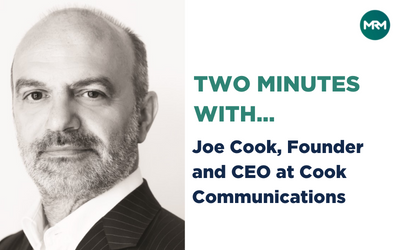Two Minutes With… Joe Cook, Founder & CEO, Cook Communications

We catch up with Joe Cook, Founder & CEO of Cook Communications, to find out his insights on corporate and financial communications, the projects he’s most proud of and his current reading list.
Tell us a bit about yourself and what you do.
I live in Prague in the Czech Republic, where I run Cook Communications, a corporate and financial PR and communications agency that I founded in 2003. We have offices in Warsaw (Poland), Bucharest (Romania) and Sofia (Bulgaria), and have consultants in Austria, Croatia and Switzerland. That makes us sound like a big company, and although we do have a large footprint across Central Europe, we are in fact a relatively small, and independent, business. We have a busy defence and aerospace practice, and a financial PR practice that ebbs and flows depending on the volume of M&A and capital markets activity, but which is underpinned by retained business with financial services, banking and investment firms.
What do you think has been the biggest influence on your career, or in the industry you work in more generally?
Prior to entering PR I was a journalist, and my editors have proved to be a lasting influence on how I work with information and language. I was lucky enough to have some really good editors who were encouraging, gave some free rein, applied the astringent when needed, and who were sticklers for precision and brevity. As for the biggest influence on the industry I work in — communications — well, it has to be Social Media, doesn’t it? It’s a very useful business tool and communications tool if used properly, on the other hand it’s all pervasive, non-stop, unedited, and a right handful at the best of times.
Is there a particular project or campaign that you’ve been a part of that you’re most proud of?
I’ve been fortunate enough to work on several major projects. In the defence sector, we work with clients that are competing for, or delivering on, enormous public procurements such as aircraft and naval vessels. We have worked with UK, US, Finnish, Norwegian, Swedish, Anglo-French, Italian and Turkish clients. The defence business grapples with political, industrial and geo-strategic issues, and is always a public-private partnership in one form or another. There are multiple audiences to address, making communications essential.
Regarding financial and corporate PR, I was lucky enough to work on a project that encompassed virtually the entire lifecycle of a mining company. It began with the acquisition of a partially listed mining company by private equity, followed by its delisting, its textbook restructuring and recapitalisation, and its flotation on three stock exchanges. That was followed by financial calendar work and, unfortunately, the demise of the business in the face of a downturn in commodity prices, which led to its delisting and, ultimately, being pushed towards insolvency and nationalisation. Throughout there was regular corporate communications work, much of it coloured by the dangerous nature of the business and the ever present tension between labour and capital. The whole saga played out over several years, and to this day we continue to work on one or two residual matters. It was quite an experience!
Is there a book or podcast that is essential for reading or listening for you?
Podcast: Straight Outta Cobham, put out twice a week by The Athletic.
Book? I read so much that it’s impossible for me to name a single “essential” book. The one I’m just finishing is Jeremy Paxman’s Black Gold, and the one now winking at me from the top of my ’to read’ pile is Noise, a flaw in human judgement by messrs Kahneman, Sibony and Sunstein
Who has single-handedly made your industry better?
As far as I’m aware, no one has single-handedly made the PR and comms industry better. It evolves, doesn’t it, in line with society, business and technology?
If you could give a younger version of yourself one piece of financial advice, what would it be?
Read up on the dollar-cost average, and put something away every month.
What is one column or website that you read every day?
Every morning I receive several newsletters that provide a snapshot of what’s going across Central Europe, plus a few generic Europe-wide newsletters. I speed read them, mentally filing useful snippets. The Fleet Sheet is an excellent daily summary of what the Czech media covers, which I’ve taken since the 1990s. The Sofia Globe does a good job on Bulgaria. The FT Europe Express is a must read, especially the Saturday edition by Tony Barber, and the Politico newsletters can be useful, although they are a bit too self-regarding. My go-to news websites are ft.com, guardian.com, thetimes.co.uk and bbc.com,.
What would you do first if you received a windfall of £10,000?
Celebrate with my family! Then have a look around for a nice old Rickenbacker 4001.
What are the biggest issues affecting you and your clients currently?
Inflation is currently a real issue across Central Europe, with high double-digit inflation rates prevailing in every country where we operate. Central banks have hiked rates in an effort to staunch inflation, which hits mortgage holders and business borrowers. Many people are caught between the two.
A recurring challenge is recruitment, although I must say that we have a great team and many of us have been together for quite a while.
